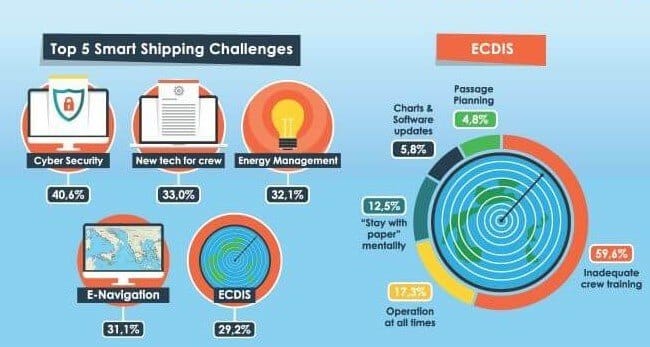

SAFETY4SEA is pleased to announce the results of its survey reflecting industry’s perception with respect to industry’s transition into the ‘smart’ era.
Digital technologies are changing the landscape of shipping industry. Many smart shipping challenges are underway causing a revolution in the way ships are navigating. We are living in the age of connected ship; the industry could benefit from the advantages of e-navigation, however, at the same time, needs to control the safety risks.


SAFETY4SEA conducted ‘Share your Smart Shipping Insights’ survey duringQ4 2016and assessed how maritime stakeholders have realized the current and future smart shipping challenges and have established the nature of ECDIS & e-Navigation, Cyber Safety/ Cyber Security, Autonomous Shipping and Future Trends within shipping.
Survey revealed that digitalization of shipping industry is imminent; the transformation has already started with the implementation of ECDIS and Big Data. Autonomous shipping is right around the corner, however it is of paramount importance to shed focus on crew training and raise cyber awareness.
• The five top rated Smart Shipping Challenges are: Cyber Security (40.6%), Crew Training using new technologies and software i.e. Virtual Reality & Augmented Reality (33.0%), Energy Management & Emissions Monitoring (32.1%), E-Navigation (31.1%) and ECDIS (29.2%)
• The majority of industry stakeholders (59,6%) argue that the inadequate crew training & familiarization with the ECDIS Model/ Type are inherent to full implementation of ECDIS, however few of them (5.4%) believe that ECDIS malfunctions have affected their operations.
• Only 19.8% have been victims of cyber-attack, considering the impact for the company insignificant (<$ 1,000) to minor ($ 3,000 – $ 10,000)
• The majority of the participants (78.8%) doesn’t consider the industry as safe and secure to cyber risks however they acknowledge that progress has been made and awareness is being built
• The most vulnerable to cyber threats systems onboard are: Positioning systems (56.9%), ECDIS (50.0%), Engine Control and Monitoring Systems (28.4%) and GMDSS (22.5%). Shipping companies show their preference to firewalls (86.9%), best practice protocols (49.5%) and intrusion detection/ prevention system (44.4%) to protect against cyber-attacks. Similar measures apply to their ships as well: firewalls (76.6%), best practice protocols (47.9%) and intrusion detection/ prevention system (29.8%).
• 41.5% of the participants believe that autonomous shipping will become a reality for the industry beyond 2030. However, there are 17.0% who think the industry is far away from this vision as human element is considered of paramount importance for shipping.
• Autonomous shipping may be implemented successfully at the following segments: short sea/ inland navigation (29.8%); containers (24.0%) and offshore activities (13.5%). The top three risks associated with the use of unmanned ships include: Navigational Risks i.e. Collision, Grounding (61.3%), cyber safety/ cyber security (51.9%) and loss of communication (46.2%)
• Smart shipping is expected to enhance shipping operations making them more efficient and effective depending on technology progress, adequate crew training, risk assessment and enforcement of solid legislation to create a level playing field worldwide.
• Autonomous operations will define industry’s future; however, firstly, it is importantto address cyber security issues. Although the industry has already been aware of the risks associated with cyber safety and security and progress has been made so far, shipping needs to make further efforts to build awareness.
• Although few incidents of cyber-attacks with insignificant impact for the victims have been reported, industry needs to establishmechanism for experience feedback and best practices. Every incident must be reported and investigated for root cause analysis and preventive actions.
• The smart era has certainly come for shipping as it is expected mobile devices and applications to be used widespread by the crew onboard in couple years. Training is the key to keep seafarers up to speed with new technology.
• For successful ECDIS operation, it is recommended crew training to be extended to include more days on Type Specific Training, for example 4-5 days instead of one day at the moment. Furthermore, IMO to enforce ECDIS as primary means of navigation such as the basic system for passage planning.
Apostolos Belokas, Managing Editor, SAFETY4SEA commented: ‘’The survey identifies critical areas that must be addressed with respect to the digitization of shipping. The start has already been made and the pathway to smart era does involve many challenges. In any case, industry has to be cautious to assure safety of life, assets and environment are adequately addressed. “
SAFETY4SEA infographic depicts survey findings and key data. The results of the survey will be further presented at the 2017 SMART4SEA Conference & Awards due on Tuesday 31st of January.
Press Release










We believe that knowledge is power, and we’re committed to empowering our readers with the information and resources they need to succeed in the merchant navy industry.
Whether you’re looking for advice on career planning, news and analysis, or just want to connect with other aspiring merchant navy applicants, The Marine Learners is the place to be.